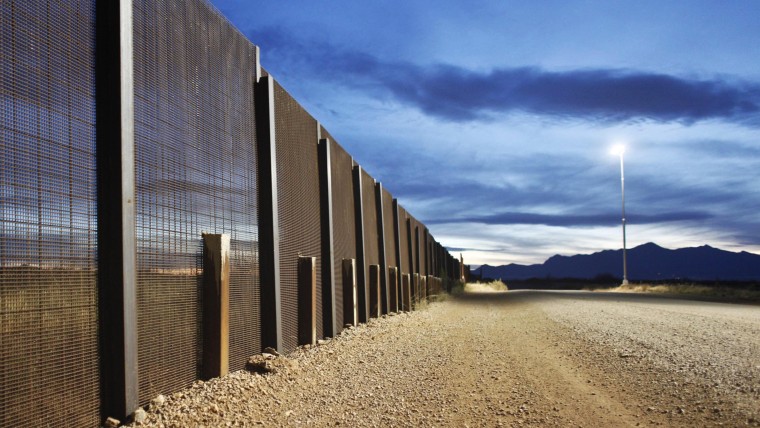When it became clear that Rep. Kevin McCarthy (R-Calif.) would succeed Rep. Eric Cantor (R-Va.) as House Majority Leader, immigration-reform proponents saw a new opportunity. Cantor was a fierce opponent of comprehensive reform and was as responsible as anyone for the lack of congressional progress. McCarthy, on the other hand, comes from a more diverse district and has made public comments suggesting possible support for a compromise.
So, has a changing of the guard in the Majority Leader's office revived hopes of actually passing a reform bill? To answer that, consider McCarthy's interview the other day with Fox News' Chris Wallace (thanks to my colleague Rawan Jabaji for the tip).
WALLACE: Immigration. You are on the record supporting a path to legalization for the millions of illegal immigrants who are now in this country. Will you try to pass comprehensive immigration reform before the election that includes, not a path to citizenship, but a path to legalization? McCARTHY: I'm on record saying nothing about immigration, until we secure the borders. The borders are not secure. Look at the humanitarian crisis that is happening right now along the border states. These are children coming from three major countries in Central America. They're going across. Kids are dying. Who knows what's happening when it comes to human trafficking and others, it's because our borders are not secure. Until you secure the borders, you cannot have the conversation about anything else.
McCarthy, who's supposed to be one of the more reasonable House Republicans on immigration, went on to reject a path to citizenship for undocumented immigrants who are already here, all while repeating a variation of "secure the borders" nine times in about a minute of airtime.
When Wallace asked, "That must come first?" McCarthy replied, "That must come first."
To put it mildly, these are not the comments of a policymaker working towards a bipartisan solution on immigration reform.
Indeed, the more one unwraps McCarthy's perspective on the issue, the more discouraging it appears.
It's been a long while since lawmakers even talked about a policy solution, but in case anyone's forgotten, the reason immigration reform was possible in the first place was that a compromise could give both parties what they want: Democrats want a pathway to citizenship, Republicans want tougher border security. Comprehensive reform delivered on both priorities simultaneously.
McCarthy wants to see a different approach: Republicans should get 100% of what they want, he says, while Democrats get 0% of what they want. Once the GOP is satisfied with having everything, Republicans will then consider related policies.
I have a hunch the party that was elected to control the White House and the Senate may not find the offer compelling.
What's more, it's also important to appreciate the degree to which it's impossible to literally "secure" every inch of 2,000-mile border between the U.S. and Mexico, making "secure the border" first a threshold that cannot be met. I'm reminded of an
Arizona Republic piece from a few years ago:
Anyone with a minimal knowledge or understanding about the nearly 2,000-mile swath of land between Mexico and the United States realizes that requiring a secure border establishes an impossible standard. [...] Tom Barry, director of the Transborder Project at the Center for International Policy in Washington, D.C., said the demand for a completely secure border is a ploy by those opposed to immigration reform to prevent new policies. "No matter how much enforcement you have, there will always be people coming through," he said. "Since that is true, opponents to immigration reform will always be able to say the border is still not secure ... and therefore we cannot pass immigration reform."
But what about McCarthy's reference to the humanitarian crisis at the border, with unattended children entering the United States from Central American countries? Greg Sargent, who's done terrific work covering this story, had a
compelling piece yesterday responding to this argument.
Amid all the noise over the crisis of minors crossing the border into South Texas, a basic fact about this debate has gotten lost: The humanitarian disaster we're now seeing is actually an argument in favor of immigration reform, not against it. Republicans have suggested the crisis proves they are right about Obama's lawlessness (he cannot be trusted to enforce the law or secure the border, so they shouldn't make a deal with him) and that the general promise of reform, or "amnesty," is acting as a magnet for kids. All of this makes it more certain they will not embrace reform this year. But this has it exactly backwards. The crisis underscores the need for reform.
The right wants increased border security? Pass comprehensive immigration reform. The right wants to resolve confusion about U.S. policy in Central American countries? Pass comprehensive immigration reform.
Greg added, "[I]f our system were functional, the current crisis would make an immigration reform deal more likely, not less. But House Republicans aren't going to make any such deal, because it remains unclear whether they can accept reform that includes legalization under any circumstances, and that is defining their response to everything immigration related. Which only underscores once again the degree to which they have essentially abdicated playing any role whatsoever in solving the broader immigration crisis the country faces."
